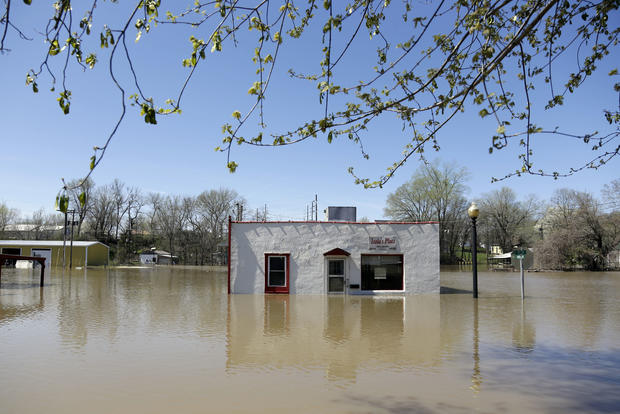Dangerous floodwaters surge in Midwest towns
CLARKSVILLE, Mo. Those fighting floods in several communities along the Mississippi River were mostly successful Sunday despite the onslaught of water, but an ominous forecast and the growing accumulation of snow in the upper Midwest tempered any feelings of victory.
The surging Mississippi was at or near crest at several places from the Quad Cities south to near St. Louis — some reaching 10-12 feet above flood stage. Problems were plentiful: Hundreds of thousands of acres of swamped farmland as planting season approaches; three people died; roads and bridges closed, including sections of major highways like U.S. 61 in Iowa and Missouri and crossings at Quincy, Ill., and Louisiana, Mo.
The U.S. Coast Guard said 114 barges broke loose near St. Louis on Saturday night, and four hit the Jefferson Barracks Bridge in St. Louis County. The bridge was closed about six hours for inspection but reopened around 8 a.m. Sunday. Most of the runaway barges were corralled but at least 10 sank and two others were unaccounted for, Coast Guard Lt. Colin Fogarty said.
Two of the confirmed flood-related deaths occurred near the same spot in Indiana; another was in Missouri. In all three cases, vehicles were swept off the road in flash floods. High water could be responsible for two more, both in Illinois, where a decomposed body was found Thursday in an Oak Brook creek and a body was found Saturday in the Mississippi River at Cora. Investigations continue.
And the danger is far from over, as spots south of St. Louis aren't expected to crest until late this week. Significant flooding is possible in places like Ste. Genevieve, Mo., Cape Girardeau, Mo., and Cairo, Ill.
Adding to concern is a forecast that calls for heavy rain Monday night and Tuesday throughout much of the Midwest. National Weather Service meteorologist Julie Phillipson said an inch of rain is likely in many places, some places even more. Rain is projected from Wisconsin through Missouri.
"That's not what we want to see when we have this kind of flooding, that's for sure," Phillipson said.
Harley-Davidson riders and bicyclists zipped through Grafton, Ill., a tourist town 40 miles north of St. Louis, many pausing to snap pictures of the swollen river.
Floodwaters were lapping against the side of Grafton's Artisan Village, a flea market-type business for artists. Owner Marty Harp, 53, sipped a Miller Lite as he cast a wary eye to the sky.
"If we can hold off the crest and it doesn't rain for a couple of days, it'll be OK," Harp said.
But anxiety looms regarding the heavy snow the northern Midwest has received this month and what happens when it melts and makes its way into tributaries of the Missouri and Mississippi rivers. Forecasters said up to 6 inches of new snow was possible in the Black Hills area of South Dakota through Monday morning.
Hundreds of miles to the southeast, in La Grange, Mo., Lewis County emergency management director David Keith wasn't bothered by the soggy forecast. Sandbags were holding back the murky Mississippi from La Grange City Hall, a bank and a handful of threatened homes. The water was receding.
"What we're worried about now is all that snow melt in North and South Dakota and Minnesota," Keith said.
AccuWeather meteorologist Alan Reppert said the timing of the snow melt could prove lucky: It may stay cold long enough up north to make for a gradual melt, giving the rivers time to thin out. Of greater concern, he said, is the Red River in North Dakota, which could see significant flooding in the coming weeks.
Along the Mississippi, a handful of river towns are most affected by the high waters — places like Clarksville, Mo., and Grafton that have chosen against flood walls or levees.
CBS St. Louis reported that volunteer Adam Mitchell drove up from O'Fallon, Missouri on Saturday to help fight the flooding in Clarksville.
"One of the streets, they were already sandbagging around the water," he said. "It had come up the street already. The area where we were at, you could watch the water creep up the guardrails."
Mitchell brought his young sons to help save Clarksville.
"They're at the age now where I thought it would be a good chance for them to be involved," he said. "They did a lot. They opened the sandbags for us while we filled them."
By Sunday, sandbagging had all but stopped in Clarksville, evidence of the confidence that the makeshift sandbag levee hurriedly erected to protect downtown would hold. Volunteers, including nearly three dozen prison inmates, worked since Wednesday, using 6,000 tons of sand and gravel.
The river was at 34.7 feet Sunday, nearly 10 feet above the 25-foot flood stage — a somewhat arbitrary term the NWS defines as the point when "water surface level begins to create a hazard to lives, property or commerce" — and expected to rise another foot before cresting Monday.
"We believe we'll have a successful conclusion," said Jo Anne Smiley, longtime mayor of the 442-resident hamlet.
Richard Cottrell, a 64-year-old antique shop owner, was hopeful, but nervous. After two days of endless sandbagging, Cottrell thought he could rest Saturday night, but the constant beeping of heavy equipment outside and flood worries kept him up.
"I had a rough night last night. I had an anxiety attack," he admitted.
Many towns on smaller rivers in other states were dealing with floodwaters, too.
In Grand Rapids, Mich., Mayor George Heartwell declared a state of emergency as the flooding Grand River poured into the basements of several hotels and other downtown buildings.
Illinois Gov. Pat Quinn declared at least 41 counties disaster areas from flooding. The Fox River in northern Illinois reached record levels, and several record crests were possible along the Illinois River.
Indiana officials were still determining whether flooded communities like Kokomo, Tipton and Elwood will be eligible for disaster aid.
